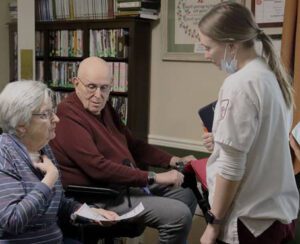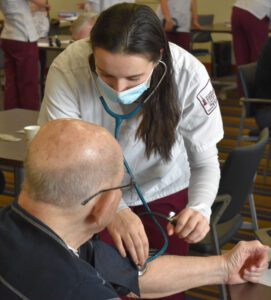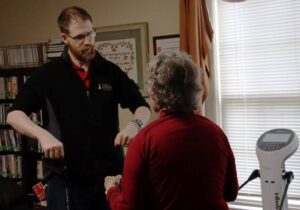Partnership with Fisher Nursing Students Grows with ‘Longevity Games’
 While St. John Fisher University nursing students have completed their semester’s work at St. John’s independent living communities, the future of the collaboration that brought them off campus remains as strong as ever.
While St. John Fisher University nursing students have completed their semester’s work at St. John’s independent living communities, the future of the collaboration that brought them off campus remains as strong as ever.
The 10-week program that saw the return of students to St. John’s Meadows and neighboring Brickstone by St. John’s wrapped up on March 21, including sessions of the popular “Longevity Games,” which partnered nursing students with independent living residents for a true intergenerational learning experience. With assistant professor Dr. Jonathan Millen overseeing the program, students traveled to St. John’s on Tuesdays to conduct clinics, wellness discussions, and health screenings.
Nursing students step out of the classroom
 “The main advantage for (St. John Fisher nursing) students is that they can take what they’ve learned and apply it and see it play out in the real world,” said Dr. Millen. Overall, students performed a series of evaluations and tests aimed at generating collective health data, while also helping independent living residents achieve long-term health goals.
“The main advantage for (St. John Fisher nursing) students is that they can take what they’ve learned and apply it and see it play out in the real world,” said Dr. Millen. Overall, students performed a series of evaluations and tests aimed at generating collective health data, while also helping independent living residents achieve long-term health goals.
The morning sessions of the students’ visits over the ten weeks included blood pressure clinics at both the St. John’s Meadows and Brickstone by St. John’s. Students also led health presentations, “Ted Talk” discussions, and open forums with groups of interested residents. While on campus, students were also able to participate in resident programming, such as strength and balance classes.
The afternoon sessions were dedicated to the “Longevity Games,” a nationally-adopted program used by researchers to track the physical and mental abilities of older adults to benchmark data focused on health and longevity. Students performed a series of evaluations measuring the physical and cognitive health of resident-participants.
Connecting physical and cognitive health
“Longevity Games” tests included interactive games of “Simon” to check working memory, incremental weightlifting to measure strength and endurance, and word matching to check executive function. Students measured and took notes on each resident’s attempts, recorded their feelings and overall abilities, and noted changes in results throughout the 10-week program.
This symbiotic program also allows the residents participating to have “that intergenerational connection,” said Dr. Millen, as well as a chance to give back in a meaningful way that ultimately will benefit future generations with the complex challenges of aging.
 Though this educational collaboration began at St. John’s several years ago, Dr. Millen noted that it was “great for us to be back since the pandemic, as the interaction was difficult behind a computer screen.” Prior to the Spring 2023 semester, exchanges between students and residents were done virtually over Zoom since the start of the COVID-19 pandemic.
Though this educational collaboration began at St. John’s several years ago, Dr. Millen noted that it was “great for us to be back since the pandemic, as the interaction was difficult behind a computer screen.” Prior to the Spring 2023 semester, exchanges between students and residents were done virtually over Zoom since the start of the COVID-19 pandemic.
Students finished their last program day at St. John’s Meadows by collecting data, which they will continue to analyze throughout the semester. However, according to Dr. Millen, the plan is for students to return to St. John’s in the Fall. An important part of the program is to complete a one-year follow-up, so students can see how the residents are doing over time. They will also discover the “longevity” of the tests and their associated benefits to residents, making this a lasting initiative that will continue to bring college students and their independent living “patients” together in a meaningful way.
